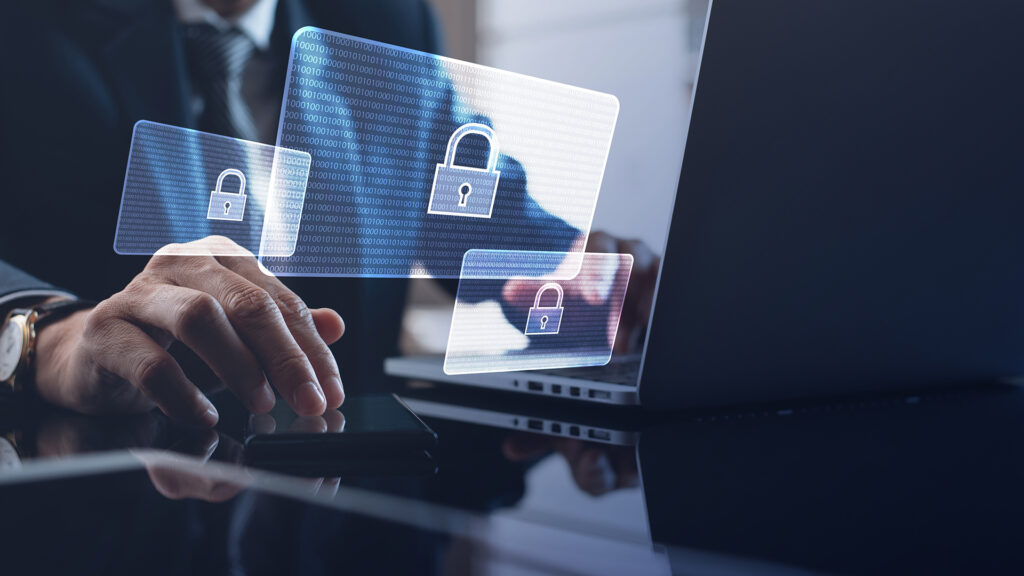Your digital identity is under constant threat. This article explores how offline biometric identity verification and tokenisation provide a more secure and convenient solution.
Offline biometric verification and tokenisation address key challenges in cybersecurity, including identity, credential, and access management (ICAM), while integrating with existing software solutions.
The cybersecurity challenge
For years, we have been told that stronger encryption and increasingly complex passwords are the key to protecting our data and identity. But is that really true? The short answer is NO. Hackers have become more sophisticated, and their tools more powerful. This has boosted the cost of cybercrime to approximately $9.22tr1 in 2024. As more connected devices come online every day, new attack doors continue to open. Unless we take serious, structural action, this number will only continue to rise.
CardLab has spent many years developing solutions to protect data, networks, critical infrastructure, and personal identity. As traditional security methods struggle to keep pace with evolving threats, CardLab has responded with a more secure and convenient alternative – biometric offline identity verification combined with tokenisation. This approach eliminates the need for static passwords and reduces the reliance on password managers, both of which are vulnerable to hacking and total loss of control of your account. In fact, in one recent mega hack, 16 billion2 passwords were stolen from platforms including Facebook, Google, and Apple.
Passwords, static credentials, online tokens, and even multi-factor authentication (MFA) remain constant targets for attackers and have introduced complexity that fosters unsecure user workarounds. Passwords can be stolen or copied, databases breached, and MFA methods such as SMS or app-based authenticators can be intercepted, creating new attack vectors while also adding friction to the user experience.
CardLab provides a solution to these challenges with:
Biometric data stored offline on the biometric card: Traditional methods, such as central biometric databases and smartphone biometric verification, have an inherent risk of being hacked and exposing biometric user data. By storing the fingerprint offline on the card, it is never visible to hackers and remains under the user’s full control. Biometric verification takes place entirely offline, outside the reach of the online attack vectors.
Tokenisation of user identity/data: Static passwords and online tokens are frequent targets for cybercriminals. CardLab addresses this by moving token generation offline, directly on the card, after the user’s fingerprint has been successfully verified. Even if intercepted in a “man-in-the-middle” attack, the token is useless to hackers, as the token cannot be used before verification in the CardLab secure backend authentication system.
Preventing human failure risk & social engineering: Complex passwords have led to unsecure user habits such as reusing the same password across multiple platforms – making one data breach potentially devastating for individuals and organisations. CardLab eliminates this risk through biometric identity tokenisation, replacing static passwords entirely – nothing to remember and nothing to reuse. Additionally, the CardLab solution is FIDO certified, ensuring strong security.
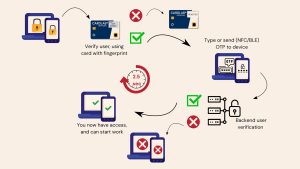
The solution provided by CardLab functions as a versatile platform capable of serving multiple sectors for identity verification and authentication. The card contains an embedded Secure Element capable of holding multiple applets, including digital identity wallets, passports, financial applications, medical records, driver’s licenses, FIDO applets, digital signing certificates, and crypto custodian wallets. The imagination is the limit, as the card can replicate smartphone app functions, but within a secure offline environment, offering significantly greater protection. Some key use cases include:
EU Digital Identity Wallet: Operated in an offline environment, making it very hard, if not impossible, for hackers to access. This eliminates the risk of the identity wallet becoming a hacker’s goldmine, as is often the case with an online platform.
Secure medical records: Medical data is stored in the Secure Element of the card and is only accessible using the correct fingerprint of the owner of the record
Tamper-proof insurance certificates: Helps insurance companies eliminate fraud involving ghost identities or identity swapping using poor-quality printed identity papers.
Protection of critical infrastructure: Enables tokenised access control to ensure only authorised personnel have access to essential services such as power, water, transportation networks and other critical grids.
Combined physical and logical access: Replaces traditional passwords with biometric verification and authentication, saving companies and organisations significant cost on IT maintenance and significantly reducing ransomware attack risks when combined with basic IT cybersecurity initiatives.
Self-custodian wallet for crypto or other digital assets: Online wallets are becoming increasingly vulnerable to attack, as seen in the latest report from Chainalysis3. The report highlights that theft of cryptocurrencies in 2025 has already surpassed the figure for the whole of 2024 and is expected to reach $4bn in theft this year.
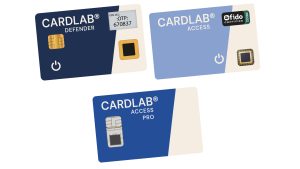
Crypto wallets require much higher security, and tokenisation of data is a way for users to stay protected and remain AML (Anti Money Laundering) compliant. This is exactly what one of CardLab’s customers, Vaultavo, has implemented by basing their own solution on CardLab technology.
Vaultavo: Biometric custody infrastructure for a digital frontier under siege
2025 is shaping up to be the most catastrophic year in crypto security history. In just six months, over $2.17bn in digital assets have been stolen. A single breach, the ByBit hack, saw $1.5bn vanish overnight, reportedly orchestrated by a state-sponsored cybercrime unit.
Yet it is not just institutions being targeted. Increasingly, it is individuals – investors, founders, employees – ambushed by phishing links, deepfakes, leaked credentials, and, in the most chilling cases, physical assault. So-called “wrench attacks” have surged to record highs as criminals escalate from screens to doorsteps.
Behind every one of these headlines lies a common flaw: outdated access models still govern a trillion-dollar digital economy.
In crypto, control of assets hinges on a private key, a digital signature that proves ownership. Lose it, and the assets are gone. Have it stolen, and they are gone too. Yet most private keys remain poorly secured: stored on phones, laptops, cloud servers, or even written on scraps of paper. Users are left juggling 24-word seed phrases or relying on insecure PINs to defend against attackers equipped with sophisticated malware and a strong motive.
It is within this real-world vulnerability that Vaultavo emerged – a fully biometric, hardware-enforced custody infrastructure that redefines how digital assets are secured, governed, and accessed.
The Vaultavo smartcard: Your fingerprint is the key
At the heart of the Vaultavo system is a truly one-of-a-kind smartcard engineered and manufactured in collaboration with CardLab.
This is no ordinary card. It integrates an FPC biometric fingerprint sensor, EAL6+ certified secure element, dynamic E-Ink display, multi-interface connectivity (USB-C, contactless, Bluetooth), and an onboard rechargeable power source.
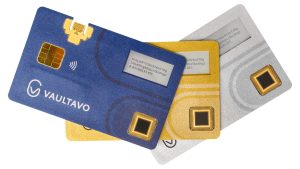
What truly sets it apart is its security architecture: your fingerprint data is never transmitted, uploaded, or stored externally. Matching is performed locally, entirely offline, inside the secure element of the card. This ensures that biometric data remains completely under user control, never exposed to online threats or central databases.
The card is air-gapped, tamper-resistant, and impossible to unlock without the registered fingerprint. There are no seed phrases to lose, no passwords to steal, and no reliance on mobile phones or apps. Security becomes physically bound to the user, eliminating credential reuse and making account takeovers virtually impossible.
Beyond the card: Infrastructure for every custody model
Vaultavo’s innovation goes beyond the smartcard. It connects to a broader platform of secure vaults and administrative controls that protect and govern the use of digital assets. In this layered design, biometric data is stored and matched exclusively within the card’s secure element, never leaving the user’s possession. Private keys, by contrast, are held in separate, highly secure hardware security modules (HSMs) located within purpose-built vault environments.
This deliberate segregation of biometric identity and private key storage ensures that there is no single point of failure. Even in the event of a compromise, the architecture prevents attackers from gaining access to both authentication credentials and the assets they protect. It is a model built on physical separation, zero trust, and user-controlled authentication.
All transactions flow through a modular digital platform where institutions can assign role-based access, enforce compliance policies, and automate governance workflows. Because access is verified through offline biometric authentication, Vaultavo eliminates the need for central identity databases and dramatically reduces the attack surface.
From cold storage to consumer wallets, almost every custody model is supported – with access and control grounded in physical fingerprint verification.
Vaultavo addresses what the industry calls the custody trilemma – the idea that security, accessibility, and ownership cannot coexist. While others are forced to compromise, Vaultavo harmonises all three by anchoring them in hardware, identity, and infrastructure.
Its impact has already been recognised. In 2025, Vaultavo received the Blockchain Innovation Award at the Asian Banking & Finance FinTech Awards and was named a Top Finalist in Accenture’s FinTech Innovation Lab Asia-Pacific.
However, its greatest significance lies in its timing. As crypto crime reaches historic highs and the line between digital and physical threat continues to blur, Vaultavo represents a critical evolution. It offers a system where security is sovereign, custody is verifiable, and the only key that matters is the one embedded in your fingerprint.
The CardLab solutions delivered to Vaultavo and others are only as good as the accuracy and durability delivered by the underlying technology. To make sure CardLab products are suitable for identity verification, CardLab has had long-standing collaborations with multiple high-security chip providers, and in particular with FPC, for their fingerprint sensors that provide a unique level of accuracy, security, and reliability.
Like CardLab, FPC understands that the rise in data breaches and high-profile digital currency thefts underscores the urgent need for robust, user-centric security solutions – now more than ever. Through its history, FPC has recognised that traditional methods of access control – such as passwords, PINs, or even hardware tokens – are increasingly vulnerable to phishing, social engineering, and remote hacks.
In contrast, biometric authentication offers a far more secure and intuitive solution by binding access to the unique physical characteristics of an individual, rather than to something they know or carry. Biometrics provide a primary or secondary factor of authentication, enabling additional security layers by strongly linking access to an individual, and thus eliminating the risk of credentials being lost, stolen, or shared.
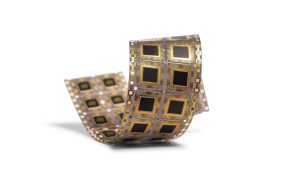
FPC’s T-Shape biometric solution, specifically the FPC1323 sensor, exemplifies the power of biometrics in today’s security landscape. Optimised for integration into smart cards, wearables, and other constrained form factors, the FPC1323 offers a low-power, high-performance fingerprint authentication system. Its ultra-thin design and energy-efficient architecture make it ideal for battery-powered or battery-free devices, while its advanced algorithms ensure rapid and highly accurate verification.
Anti-spoofing technology is also available within the FPC T-Shape family, which has been developed for the payments sector, where the FPC1323 solution in a payment card is certified by both VISA and Mastercard. Therefore, companies and customers can be confident that FPC’s solutions are tested to the most stringent security standards. Whether used to secure cryptocurrency wallets, authenticate transactions, or protect sensitive access points, the FPC1323 ties each interaction to a verified identity—one that cannot be easily duplicated or compromised.
This individual-bound access significantly reduces the risk of fraud, identity theft, and unauthorised account takeovers. Because biometric data is stored and matched securely on the CardLab card itself, without needing to transmit or store it centrally, the attack surface is further minimised while also addressing GDPR and privacy constraints. For financial institutions, digital asset providers, and end-users alike, FPC’s biometric solution delivers peace of mind by creating a secure, frictionless experience. In a world where digital identities are under constant threat, the FPC1323 T-Shape sensor stands as a critical line of defence—proving that the future of secure access lies not in what we remember, but in who we are.
Securing the digital life
As cyber threats continue to evolve, organisations need to adopt solutions that provide maximum protection without sacrificing convenience. The CardLab access control solutions address these challenges by using offline processing of biometric verification to ensure that sensitive data remains secure at every stage.
By eliminating the need for passwords and network-dependent tokens, this card provides a future-proof access control solution that is scalable, easy to integrate with existing systems, and compliant with global privacy standards. Whether it’s securing enterprise facilities, protecting government data, Digital Wallet data or ensuring compliance in financial institutions, CardLab’s system is the solution for the modern world of access control, wallets, passkeys, etc.
In closing, while this article has focused primarily on security, it’s important to highlight that the CardLab system solution offers a range of additional valuable benefits:
MFA requirements can be fulfilled by the card in one combined process, saving a lot of time when doing online banking or making online payments.
Equipping employees with a biometric card solution can be done at a fraction of the cost of providing employees with a company phone.
The card can be used for identity verification in areas where smartphones and other connected devices are prohibited.
The CardLab card solution cannot be tracked and becomes a personal threat – something that cannot be said of smartphones or any connected device.
The pain of remembering and continuously updating passwords will become history, and one less hassle in your daily work – saving time and reducing related errors and risks.
In collaboration with its partners and suppliers, CardLab delivers a solution that combines convenience with advanced cybersecurity, empowering users to take control of their digital lives with full authority over their own data.
References
Cyber Security Ventures, ExpressVPN
https://www.forbes.com/sites/daveywinder/2025/06/20/16-billion-apple-facebook-google-passwords-leaked—change-yours-now/
2025 Crypto Crime Mid-year Update: Stolen Funds Surge as DPRK Sets New Records
Source link

